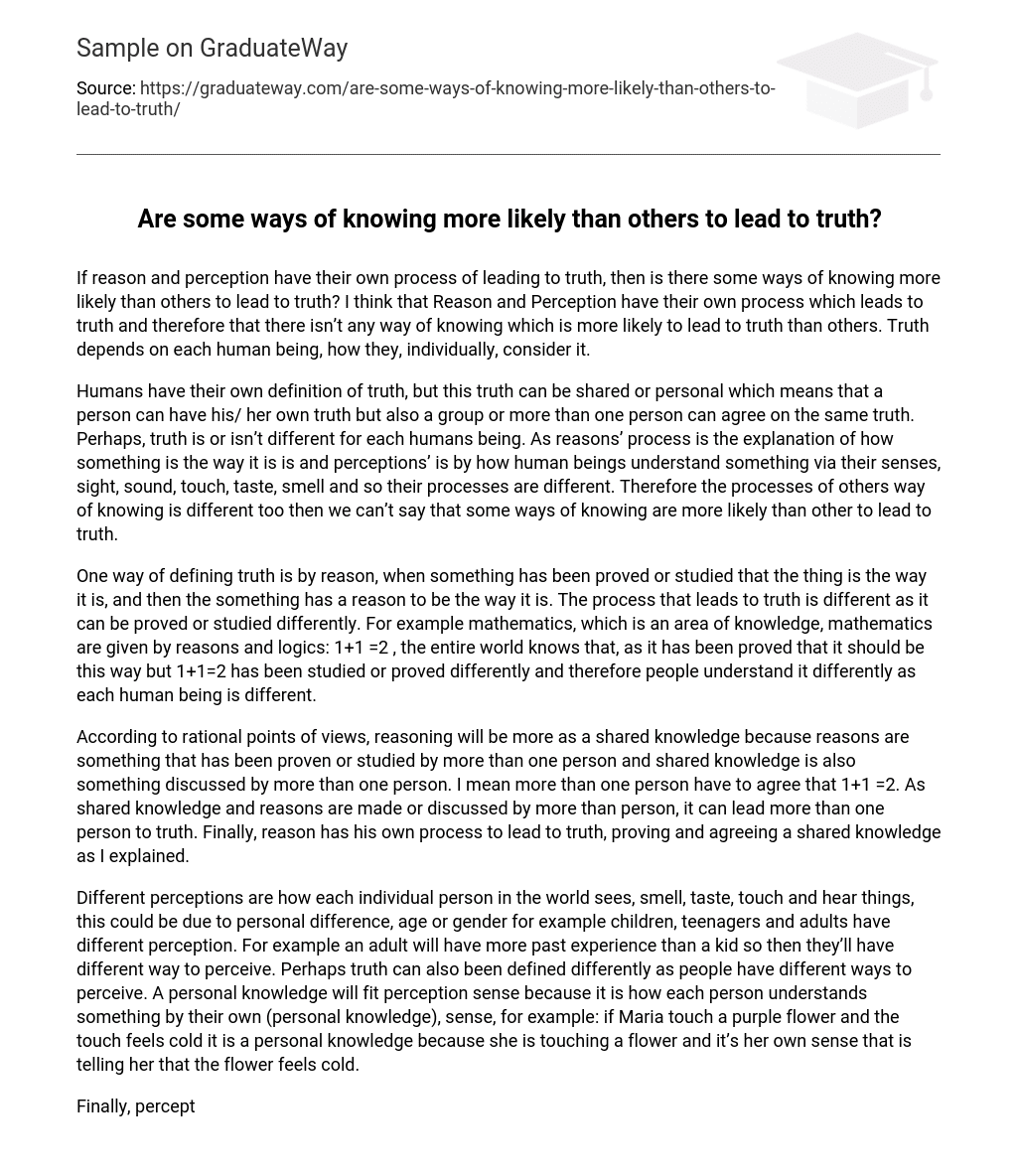If reason and perception have their own process of leading to truth, then is there some ways of knowing more likely than others to lead to truth? I think that Reason and Perception have their own process which leads to truth and therefore that there isn’t any way of knowing which is more likely to lead to truth than others. Truth depends on each human being, how they, individually, consider it.
Humans have their own definition of truth, but this truth can be shared or personal which means that a person can have his/ her own truth but also a group or more than one person can agree on the same truth. Perhaps, truth is or isn’t different for each humans being. As reasons’ process is the explanation of how something is the way it is is and perceptions’ is by how human beings understand something via their senses, sight, sound, touch, taste, smell and so their processes are different. Therefore the processes of others way of knowing is different too then we can’t say that some ways of knowing are more likely than other to lead to truth.
One way of defining truth is by reason, when something has been proved or studied that the thing is the way it is, and then the something has a reason to be the way it is. The process that leads to truth is different as it can be proved or studied differently. For example mathematics, which is an area of knowledge, mathematics are given by reasons and logics: 1+1 =2 , the entire world knows that, as it has been proved that it should be this way but 1+1=2 has been studied or proved differently and therefore people understand it differently as each human being is different.
According to rational points of views, reasoning will be more as a shared knowledge because reasons are something that has been proven or studied by more than one person and shared knowledge is also something discussed by more than one person. I mean more than one person have to agree that 1+1 =2. As shared knowledge and reasons are made or discussed by more than person, it can lead more than one person to truth. Finally, reason has his own process to lead to truth, proving and agreeing a shared knowledge as I explained.
Different perceptions are how each individual person in the world sees, smell, taste, touch and hear things, this could be due to personal difference, age or gender for example children, teenagers and adults have different perception. For example an adult will have more past experience than a kid so then they’ll have different way to perceive. Perhaps truth can also been defined differently as people have different ways to perceive. A personal knowledge will fit perception sense because it is how each person understands something by their own (personal knowledge), sense, for example: if Maria touch a purple flower and the touch feels cold it is a personal knowledge because she is touching a flower and it’s her own sense that is telling her that the flower feels cold.
Finally, perception have an own process to lead to truth, and in this case, perception lead to truth individually or personally meaning that a person believe that something is true by his/her own experience of knowing things or his/her own perception as I explained. To conclude, Reason and Perception has a different process to lead to truth, such as reasoning, the process is by proving how something is the way it is, for example as people understand the concept of how something is the way it is, then they agree or say that the something is “true”.
For perception the process of leading to truth are by senses, for example a person will say that something is true by her/his sight. Now these two processes are different but they lead to truth, we can’t say that reasoning which is mainly a shared knowledge as I explained, is most likely to lead to truth than perception which is more likely a personal knowledge because no ones can truly confirm that shared knowledge is better or can lead to truth more than personal knowledge. This can’t be confirmed because the truth as I explained in the introduction could be agreed individually or agreed by more than one person, which shows that there isn’t an exact verification to prove that some way of knowing is more likely to lead to truth than others. Therefore I believe that any other way of knowing lead to truth also differently.
At last, there aren’t ways of knowing which are more likely than others to lead to truth, because the processes of each way of knowing are different as I explained about reason and perception and humans define truth differently.





